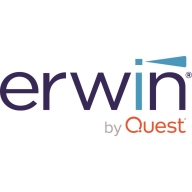

Erwin Data Intelligence by Quest and Collibra Lineage compete in the data management and governance category. Erwin holds an upper hand due to its strong automation features and competitive pricing, but Collibra is favored for its flexible governance capabilities.
Features: Erwin Data Intelligence offers automation scripts for metadata and mapping, integrated data catalogs, and a centralized business glossary. Collibra Lineage provides extensive data lineage visibility, flexible integration with various tools, and custom self-service governance processes.
Room for Improvement: Erwin Data Intelligence needs enhanced backend SDK and API functionality and a more intuitive menu structure. Connectivity improvements and more out-of-the-box connectors are areas where Collibra Lineage can improve, along with addressing its pricing model complexities and module costs.
Ease of Deployment and Customer Service: Erwin Data Intelligence supports on-premises and cloud deployments, with improved but inconsistent customer service. Collibra Lineage allows hybrid cloud environments, backed by proactive support meeting SLAs, offering reliable customer experiences.
Pricing and ROI: Erwin Data Intelligence is competitively priced, providing substantial ROI from automation efficiencies. Collibra Lineage, while potentially costly for small businesses, offers strong ROI through quick implementation and standardized processes development.


Data lineage reveals how data transforms through its life cycle across interactions with systems, applications, APIs and reports. Collibra Lineage automatically maps relationships between data to show how data sets are built, aggregated, sourced and used.
The erwin Data Intelligence Suite (erwin DI) combines data catalog and data literacy capabilities for greater awareness of and access to available data assets, guidance on their use, and guardrails to ensure data policies and best practices are followed. Automatically harvest, transform and feed metadata from a wide array of data sources, operational processes, business applications and data models into a central data catalog. Then make it accessible and understandable within context via role-based views. This complete metadata-driven approach to data governance facilitates greater IT and business collaboration.
We monitor all Data Governance reviews to prevent fraudulent reviews and keep review quality high. We do not post reviews by company employees or direct competitors. We validate each review for authenticity via cross-reference with LinkedIn, and personal follow-up with the reviewer when necessary.